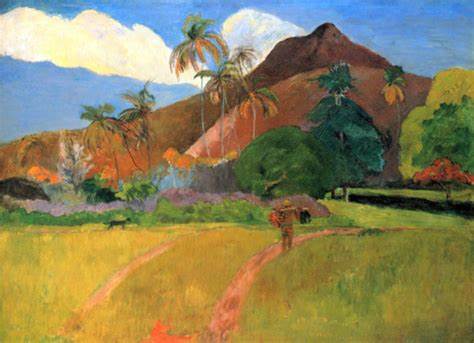There is melancholy and loss here.
還有愁思與迷失
Gauguin's paintings of the Tahitians were, in one sense,an honest account of the condition in which he found them...
從某種意義上說 高更的塔希提人繪畫是對他看到的當?shù)厝松媲闆r的真實寫照
A people in the latter stages of contamination by the civilising mission,a people consumed by the European society Gauguin thought he had left behind.
他們處于被現(xiàn)代文明同化的后期階段 高更以為自己逃離的那個歐洲社會 已將其吞噬殆盡
We should not forget that Gauguin was a vocal critic of French colonialism in Tahiti,
我們不要忘記高更曾直言不諱地批評了 法國對塔希提的殖民
and that one particular aspect of the way he saw himself made his view of civilisation more complex than he's normally given credit for.
而且他描繪自己的獨特視角 使他對文明的評判 比人們通常認為的更加錯綜復雜

Like most Europeans, he saw the world as being divided between those who lived civilised, somewhat artificial lives and those who had remained in a natural, savage state.
和大多數(shù)歐洲人一樣 他把世界上的人劃分為 生活在被人為干預過的 文明社會中的人 和那些生活在自然 蠻荒狀態(tài)下的人
But he believed he himself was mixed race -French-Peruvian but also partly Incan.
但他相信自己是混血 是有印加血統(tǒng)的法裔秘魯人
And those two states, the natural and the savage,existed within him, literally in his blood.
而那兩種狀態(tài) 自然與野蠻在他身上共存 實打?qū)嵉卦谒难豪?span style="white-space:normal;">
So in Tahiti he wasn't just looking for a lost island paradise,he was searching for a lost part of himself.
他不僅是在塔希提尋找一個遺落天堂 他同時也在尋找自身缺失的一部分
But Gauguin's last great work suggests that his search for identity and meaning was never resolved.
但高更的最后一幅偉大作品指出 他對自我和人生意義的探索從未有結(jié)果
On a vast canvas, a row of Polynesian women represent the universal cycle of life,from birth to old age.
巨大的畫布上 這一排波利尼西亞婦女代表著生命周期的循環(huán)往復 出生到遲暮
Death and the beyond are represented by a blue idol.
藍色的神靈代表著死亡和來世
It's a Gauguin invention,though based on his fascination with the myths of the lost Tahitian past.
這是高更的創(chuàng)造 盡管是建立在他對于 遺失的塔希提歷史的迷戀之上
In trying to find an antidote to modern life,Gauguin had turned to the art and culture of a civilisation most Europeans would have labelled primitive.
為了找到現(xiàn)代生活的解藥 高更將目光轉(zhuǎn)向了很多歐洲人 認為是原始文明的藝術(shù)和文化
Yet, in the end, perhaps he concluded that there are no answers to the universal questions about the meaning of life and death.
而最終 他得出的結(jié)論似乎是有關(guān)生死意義的普遍命題根本沒有答案











